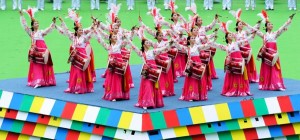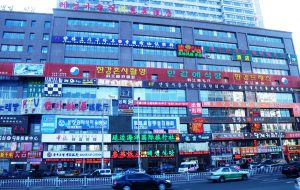The people of Yanji really like dogs. They have a street devoted to them, and the city is home to an annual dog festival. Yanji does not like dogs the way you might like dogs, because what they like about dogs is eating them.
 Now before anyone calls PETA, it’s important to understand why and how Yanji became the dog eating capital of China.
Now before anyone calls PETA, it’s important to understand why and how Yanji became the dog eating capital of China.
We tend to associate Chinese people with the culture, food and appearance of the Han ethnic majority. That’s 91.5% correct, but 8.5% of China is split into fifty-five distinct ethnic groups. Some, such as the Tibetans, have populations in the millions. Others consist of a few thousand, and some trace their routes from different countries. The Korean Chinese ethnic group is one of these. In the past, Korea was bigger than it is today. A decent chunk of modern China is historically Korean, and this land now forms the border between the two. The area is known as Yanbian Autonomous Prefecture, home to the largest Korean diaspora in the world. The capital, cultural centre, and economic hub is Yanji.
It’s standard to talk about Korea in terms of North and South; separate and apart. That’s what makes Yanji so unique. It borders North Korea and belongs to the Peoples Republic of China, so the communist influence is very apparent. North Korean hotels and restaurants are numerous, and it isn’t difficult to spot a North Korean in Yanji. Still, China has open arms for those who can bring in cash; an increasing percentage of Yanji’s businesses are South Korean. South Korean tourism to Yanji is popular and there are daily direct flights from Seoul. One reason for this is the proximity to Paektu Mountain, the historical birthplace of the Korean people.
 It’s no secret that North and South Korea developed in very different directions. In some respects, they have become polar opposites. Even the language is no longer totally mutually intelligible; there’s an app available that translates between the two. The vast majority of Peninsula-born Koreans spend their lives unable to access half of their homeland. Yanji is a place to experience the other side. North Korean restaurants are popular with businessmen from the South, and South Korean media is quietly passed down the China-DPRK border. In Yanji, television is broadcast in Korean. Signs are written first in Korean, then Chinese. Holders of either passport can visit freely. It’s not quite a neutral territory, but it’s close enough. Culturally, Yanji also represents the Korea of old. The Korean-Chinese ethnic group as a whole do not subscribe to the post-war ideology of either state. They focus on the traditional; Korean music, dance, painting, and sports. People come here for a feel of what their culture used to be like, and that includes eating dog.
It’s no secret that North and South Korea developed in very different directions. In some respects, they have become polar opposites. Even the language is no longer totally mutually intelligible; there’s an app available that translates between the two. The vast majority of Peninsula-born Koreans spend their lives unable to access half of their homeland. Yanji is a place to experience the other side. North Korean restaurants are popular with businessmen from the South, and South Korean media is quietly passed down the China-DPRK border. In Yanji, television is broadcast in Korean. Signs are written first in Korean, then Chinese. Holders of either passport can visit freely. It’s not quite a neutral territory, but it’s close enough. Culturally, Yanji also represents the Korea of old. The Korean-Chinese ethnic group as a whole do not subscribe to the post-war ideology of either state. They focus on the traditional; Korean music, dance, painting, and sports. People come here for a feel of what their culture used to be like, and that includes eating dog.
In the West, eating dog is taboo. Issues with animal welfare is usually cited as the reason, but if we’re honest the outcry isn’t just about how the dogs are kept and killed. It’s culturally ingrained that our four-legged friend is not okay to eat. A cute rabbit, sacred cow or intelligent pig is totally fine, and you probably don’t tend to question how it was treated. Dog meat is also controversial in South Korea, but for completely different reasons.
Koreans like dog meat. Eating dog is part of their history and culture, and it’s perceived as good for the health. The issue is that South Korea cares deeply about the perception of Koreans by the rest of the world. They want to be seen as an advanced, forward-thinking, first world country; not the place that eats your pet. Dog restaurants have pretty much been outlawed, but they obviously still exist. The last time I was in Seoul my Korean friend explained it was the first “summer day of dog” and that we had to eat dog meat that day. We headed to a backstreet restaurant that served “sweet meat”, a common code for dog.In Yanji, there is no fretting about perceptions and moral codes. You can eat dog to your hearts content in the hundreds of dog restaurants available. Whether Yanji represents nostalgia for an old Korea, curiosity for what lies across the border, or a cultural experience more genuine than can be found on the peninsula, it certainly offers something uniquely Korean that cannot be seen anywhere else.





